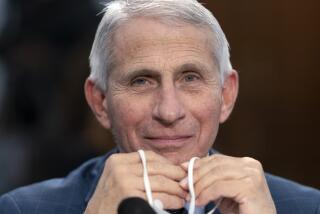Drug-Free Olympics Lose a Champion in McCaffrey
- Share via
Barry McCaffrey, who announced Monday that he intends to step down Jan. 6 as the U.S. government’s so-called drug czar, has used the post to press for curbs on the use of drugs in sports--particularly Olympic sports.
McCaffrey, 57, a retired four-star Army general, has consistently been vocal, straightforward and unrelenting in pursuit of a drug-free, level playing field in which, as he put it in an interview with The Times on Monday, the winner of a given race is the athlete with “the most talent, not the one who has the best pharmacist.”
His often-blunt remarks and direct style have frequently irritated some members of the International Olympic Committee, who view him as a moralist or opportunist.
In turn, he said Monday that dealing with the IOC has been a “learning experience,” adding, “I’ve spent at least a decade working [with] international organizations. I’ve never seen anything like it.”
Supporters stressed, however, that McCaffrey played a significant role--often behind the scenes--as the IOC over the past two years took on a more aggressive anti-doping stance and helped to launch the new World Anti-Doping Agency.
The recently concluded Sydney Games also marked the first time that the IOC tested for the performance-enhancing hormone EPO, which helps cheaters train longer and harder. The IOC moved with unusual speed earlier this summer in approving the test--in part a function of McCaffrey’s emergence as a player in the anti-doping arena and the influence he could bring as a White House emissary.
“A major breath of fresh air,” said Penn State professor Charles Yesalis, an expert on the IOC’s anti-doping efforts. “I’m sorry to see the guy go.”
Belgium’s Jacques Rogge, an influential IOC member, called McCaffrey “absolutely straightforward” and “absolutely motivated.”
Rogge also said: “He’s never been negative in his actions. His comments once in a while were negative on the IOC.”
But, in sum, Rogge said: “He had a positive impact, yes.”
McCaffrey has been the head of the White House drug policy office since 1996. He is the nation’s fourth drug czar--after William J. Bennett, former Florida Gov. Bob Martinez and former New York police commissioner Lee P. Brown. None was as active as McCaffrey in the area of sports and drugs.
The post is a presidential appointment. With the presidential elections upcoming, it remains unclear who the next drug czar will be, and whether he or she will continue McCaffrey’s aggressive anti-doping campaign. He said Monday he hoped that his successor’s priorities would include the escalation of anti-doping measures for young athletes experimenting with steroids and other substances.
McCaffrey used the post as a bully pulpit to push the idea that curbing the use of performance-enhancing substances among athletes, especially in Olympic sports, would deter U.S. teens’ drug use.
Such athletes, he asserted Monday, play a “huge role” in “shaping youth attitudes.”
Last November, in a tacit admission that the system of controls it had been using since the 1960s was not enough, the IOC helped launch the World Anti-Doping Agency. WADA brings together for the first time sports and government officials in what is supposed to be a coordinated anti-doping campaign.
During the Sydney Games, the IOC reported 11 positive tests--nine from in-competition drug controls, two from out-of-competition tests. The 11 positives are the most at the Olympics since 12 were recorded at the in 1984. USA Track & Field came under fire--first as it was disclosed that shotputter C.J. Hunter had tested positive four times this summer for the steroid nandrolone, then amid allegations of withholding information on 12 to 15 positive drug tests over the past two years. USA Track & Field CEO Craig Masback denied cover-ups. Yet McCaffrey called for a full, public accounting of all tests.
“That’s an acid test right there,” said John Hoberman, a University of Texas professor and anti-doping expert. “When a national official is willing to criticize or call into question the practices of other officials of his nationality, that’s good news in the doping control world.”
McCaffrey said Monday that he believes it will take “five years to get this thing where we want it.”
But he also said: “We’ve come a long way, haven’t we?”
More to Read
Go beyond the scoreboard
Get the latest on L.A.'s teams in the daily Sports Report newsletter.
You may occasionally receive promotional content from the Los Angeles Times.






